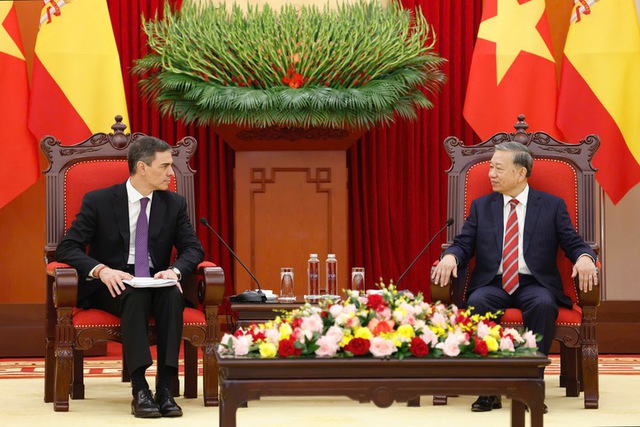General Secretary To Lam hosts Spanish Prime Minister Pedro Sánchez
VGP - General Secretary To Lam on Wednesday hosted a reception for Spanish Prime Minister Pedro Sánchez who is on a three-day official visit to Viet Nam.

General Secretary To Lam (R) hosts a reception for Spanish Prime Minister Pedro Sánchez, Ha Noi, April 9, 2025 - Photo: VGP
To affirmed that Viet Nam wishes to deepen its multi-faceted cooperation with Spain, a key member and gateway of the European Union.
He emphasized the significance of the Spanish leader's first official visit to Viet Nam since the two countries set up diplomatic relations in 1977, expressing confidence that the visit will inject momentum to elevate the Viet Nam–Spain Strategic Partnership to new heights, for the prosperity and benefits of their peoples, and for peace, cooperation, and development in the region and the world.
Viet Nam pursues a policy of self-reliance, overcoming challenges by diversifying its markets with regions around the world such as the EU, Africa, and others, stated the host, adding that the Southeast Asian country is also promoting the development and application of science and technology, while strengthening trade exchanges with partner countries and traditional friends, including Spain.
To highlighted the need to foster stronger ties in science and technology, as well as in transportation—areas in which Spain has strengths and Viet Nam has growing needs.
There is great potential for cultural and tourism cooperation between the two countries, particularly the increasing number of Spanish tourists visiting Viet Nam, noted the Party chief.
Sánchez, for his part, hailed Viet Nam's role and position in the region and the world, asserting that Spain stands ready to serve as a bridge to further promote Viet Nam–EU relations and emphasized Spain's desire to elevate the bilateral ties with Viet Nam into a Comprehensive Strategic Partnership.
Spain will advocate for the early ratification of the EU–Viet Nam Investment Protection Agreement (EVIPA) by EU member states, reiterated Sánchez.
He proposed Viet Nam send a delegation to Spain to exchange and learn from Spain's experience in order to urge the European Commission to lift the "yellow card" on Vietnamese seafoods.
Spanish enterprises are willing to participate in infrastructure and railway projects, contributing to Viet Nam's development, said Sánchez.
The Spanish Prime Minister spoke highly of Viet Nam's efforts in contributing to the resolution of global issues and welcomed the nation's hosting of the 4th Partnering for Green Growth and the Global Goals 2030 (P4G) Summit this month.
He also confirmed that Spain will have a representative attending the Summit.
Both leaders vowed to strengthen cooperation in areas such as defense and security, agriculture, and education and training, while also expanding collaboration into potential fields such as innovation, artificial intelligence, semiconductors, and digital transformation.
The two nations should foster close cooperation at multilateral forums and international organizations, promote multilateralism and uphold international law to address regional and global challenges—especially in the context of a rapidly changing and increasingly complex world, including issues related to the East Sea./.

